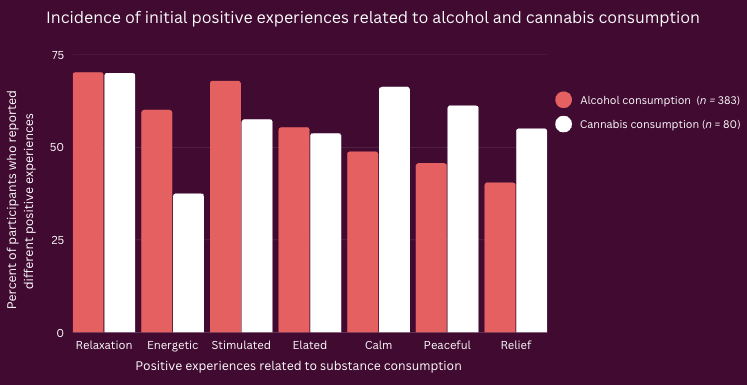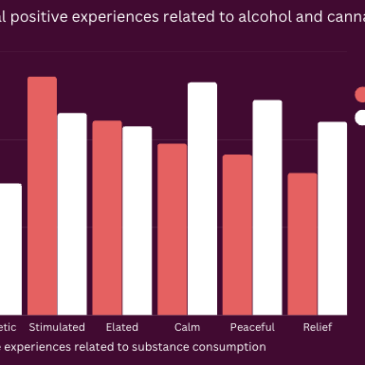Editor’s Note: Today’s review is part of our month-long Special Series on Pathways to Addiction. Throughout March, The BASIS is highlighting risk factors for and pathways to addiction.
Alcohol and cannabis are two of the most frequently used substances in the United States. Recent data from 2021 found that 133.1 million people drank alcohol in the past month, with another 36.4 million people using marijuana in the past month. Initial positive experiences with substance use have the potential to influence the likelihood that people engage in heavier levels of substance use later in life. However, the research in this area is limited and has not examined the relationship between initial positive experiences with substance use and current experiences with substance use disorders. This week, as part of our Special Series on Pathways to Addiction, STASH reviews a study by Neil Varshneya and colleagues that addresses this question.
What was the research question?
Will initial positive experiences with alcohol or cannabis use predict the likelihood that participants have a substance use disorder?
Author’s notes, Dr. Neil Varshneya: “There were several motivations for me to study the relationship between initial drug use and future drug abuse risks. Drug abuse is associated with numerous physical and mental health problems, including addiction and overdose, and presents serious health concerns and a wide range of societal costs. Understanding drug abuse can help identify risk factors, develop prevention and treatment strategies, and improve overall public health outcomes. Through drug abuse research, I believe we can better support individuals struggling with addiction and help prevent issues with drug misuse from occurring before they ever start.” (We thank Dr. Varshneya for sharing personal thoughts about the article.)
What did the researchers do?
The researchers collected cross-sectional data from 463 individuals who indicated that their first substance use experience was with either alcohol (n = 383) or cannabis (n = 80) from Amazon’s Mechanical Turk. Participants were asked to recall their initial experiences with substance use and indicate whether they experienced a series of positive, neutral, or negative subjective effects. Those enrolled in the study were also asked to complete a hypothetical purchase task in which the researchers estimated whether the cost of alcohol and cannabis impacted how much participants wanted to consume each substance.
Author’s notes, Dr. Neil Varshneya: “The most satisfying part of completing this work was learning advanced statistical techniques such as ordinal logistic regression and behavioral economic analysis of demand intensity and elasticity. Data analysis in drug abuse research can be particularly challenging, as the data can be complex, messy, and difficult to interpret. However, this research has been extremely rewarding as it has helped me to gain a deeper understanding of the issues surrounding drug abuse and addiction.”
What did they find?
The researchers found that participants who had more positive initial experiences reported more symptoms related to substance use disorder. The most commonly reported positive initial experiences across both alcohol and cannabis consumption included feeling relaxed, energized, stimulated, elated, calm, peaceful, and relieved (see Figure). Participants who reported feelings of relief during their first alcohol use experience had increased odds of developing alcohol use disorder later in life. Similarly, participants expressing that they felt energized after their first cannabis use experience were more likely to develop cannabis use disorder.

Figure. The percentage of participants who reported different positive experiences related to their alcohol and cannabis consumption. Adapted from Neil Varshneya and colleagues. Click image to enlarge.
Why do these findings matter?
The writer Nic Sheff recalled in his memoir Tweak: Growing Up On Methamphetamines, “I first smoked pot when I was eleven. I felt this very immediate sense of relief. Up until that point, I had felt so insecure and uncomfortable in my own skin. I just didn’t fit in anywhere. Smoking pot for the first time felt like the first real answer that I had ever found.”
Sheff went on to develop a prolonged addiction to methamphetamines and other drugs. The findings of this study resonate with Sheff’s personal experience, suggesting that initial subjective effects with substance use may predict the development of future substance misuse and substance use disorders. This finding is important because it indicates that efforts are needed to identify what factors qualify initial substance use experiences as favorable or unfavorable and whether any groups of people are more likely to have favorable initial experiences. Creating profiles of people who are at a greater risk for developing a substance use disorder can help researchers and practitioners to more effectively intervene with high-risk individuals prior to developing a substance use disorder.
Every study has limitations. What are the limitations in this study?
The study used data that was collected via self-report. This means that the study’s data could be impacted by the participants’ ability to accurately remember information. This limitation is pertinent because the study had participants recall their initial experiences with substance use. Self-report data is also limited because it can be affected by social desirability bias.
For more information:
If you are worried that you or someone you know is experiencing addiction, the SAMHSA National Helpline is a free treatment and information service available 24/7. For more details about addiction, visit our Addiction Resources page.
— Seth McCullock, PhD
What do you think? Please use the comment link below to provide feedback on this article.




